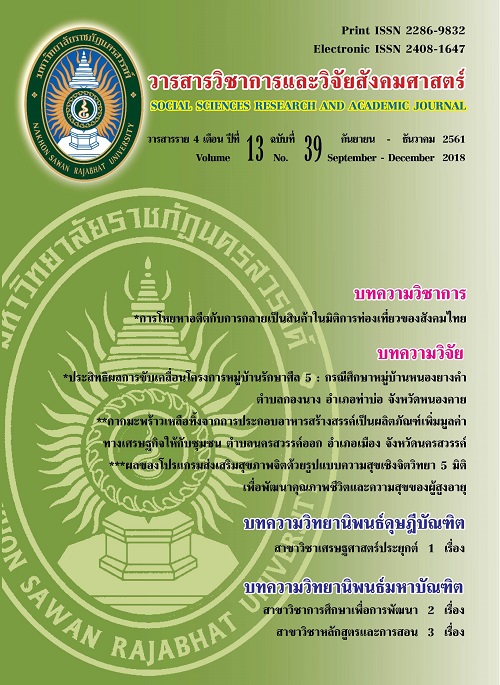การสร้างพื้นที่ของกลุ่มผู้พิการจังหวัดเชียงใหม่ Construction of Social Space by the Disabled Person in Chiang Mai
Main Article Content
Abstract
วัตถุประสงค์ในการศึกษาวิทยานิพนธ์นี้คือ 1) ศึกษากระบวนการสร้างพื้นที่ทางสังคมของผู้พิการจังหวัดเชียงใหม่ 2) ศึกษาผลของการสร้างพื้นที่ทางสังคมของผู้พิการจังหวัดเชียงใหม่ ผู้ศึกษามีความสนใจ กรณีศึกษา 2 กรณี ได้แก่ กลุ่มผู้พิการศูนย์ฝึกอาชีพคนพิการอาเซียน จังหวัดเชียงใหม่ ด้วยเหตุผลว่าเป็นกลุ่มได้รับการสนับสนุนจากภาครัฐและเอกชนอย่างเต็มที่ กรณีที่ 2 กลุ่มผู้พิการชาติพันธุ์พื้นที่สูงในเขตตำบลแม่นาวาง อำเภอแม่อาย ที่ไร้สัญชาติไทยจึงไม่สามารถเข้าถึงสิทธิและสวัสดิการที่พึงได้รับ ผลที่ได้จากการวิจัยพบว่ากระบวนการสร้างพื้นที่ของกลุ่มที่ 1 และกลุ่มที่ 2 เกิดจากความต้องการด้านการยอมรับจากสังคม โดยผู้พิการต้องประเมินจุดอ่อน จุดแข็งของศักยภาพตนตามความเป็นจริงว่าจะนำไปสู่การยอมรับได้อย่างไร
กลุ่มผู้พิการศูนย์ฝึกอาชีพคนพิการอาเซียน สร้างพื้นที่ด้วยการใช้สิทธิคนพิการเข้ารับการฝึกในหน่วยงานที่ฝึกอาชีพเกี่ยวกับการผลิตพืชผลทางการเกษตรเพราะเป็นความรู้ที่ถูกต้องตามหลักวิชาการเกษตรมีการทดลองและที่สำคัญหน่วยงานที่ฝึกสามารถหาตลาดมารองรับผลิตผล อาชีพที่ผู้พิการได้ทำหลังจากจบหลักสูตร
กลุ่มผู้พิการชาติพันธุ์พื้นที่สูงฯ ไม่มีสัญชาติไทยทำให้ไม่สามารถเข้าถึงการสร้างพื้นที่ด้านอาชีพผ่านหน่วยงานที่ให้ความช่วยเหลือผู้พิการได้จึงต้องดิ้นรนประกอบอาชีพตามสภาพความพิการโดยเป็นงานรับจ้างเท่าที่มีการจ้างงานในพื้นที่ ขณะเดียวกันผู้พิการแสดงความสามารถพิเศษที่ตนมีผ่านพื้นที่โบสถ์คริสตจักรเซเวนต์เดย์แอดเวนทิสต์ซึ่งเป็นที่รวมของคนทั้งหมู่บ้านโดยการช่วยกิจกรรมโบสถ์อย่างแข็งขัน ทำให้เป็นที่ยอมรับของชุมชนมากขึ้น ผลจากการสร้างพื้นที่ทางสังคมของทั้งสองกลุ่มเมื่อประเมินจากระดับความพึงพอใจพบว่ากลุ่มผู้พิการศูนย์ฝึกอาชีพคนพิการอาเซียนมีความพึงพอใจในระดับดีมาก ส่วนกลุ่มผู้พิการชาติพันธุ์พื้นที่สูงฯมีความพึงพอใจในระดับหนึ่งแต่ยังคงต้องการความช่วยเหลือด้านการได้สัญชาติไทยเพื่อเข้าถึงสวัสดิการด้านต่างๆโดยเฉพาะเบี้ยผู้พิการและอุปการณ์อำนวยความสะดวก
The objective of this thesis is to 1) study the process of the construction of Social Space by disabled person in Chiang Mai 2) study on the result of the construction of Social Space by disabled person in Chiang Mai. The researcher is interested in two case studies: disabled people in Asean Disability Training Center in Chiang Mai because the group is fully supported by the government and private sector. Another case study is the ethnic minority group on a plateau in Tambon Mae-Na-Wang, Mae-ai district who have not granted in Thailand and are not able to access to the rights and welfare they deserve. The results of the research show that the process of construction of social space of group 1 and 2 is a result of the need for social acceptance. The disabled must assess their strength and weakness based on the fact it will lead to acceptance.
The Asean Disability Training Center construct the social space by granting disabilities the access to participate in the vocational trainings regarding the agricultural production by providing the proper knowledge and also helping them with the plantation. Ethnic minority people on plateau who were not granted Thai nationality are ineligible to access to the career opportunities through agencies who normally provide assistance to people with disabilities, thus they have to make a living with their disability condition as a hired worker in a limited jobs available in the area. At the same time, some of disabled construct their social space by exposing their talents through the Church of the Seventh-day Adventist Church, where the whole of village is gathered together and by actively giving the church their hands.
The result of the construction of Social Space, gauging from the level of satisfaction, is that the disabled people from Asean Disability Training has high level of satisfaction. While the ethnic minority group on a plateau has somewhat satisfactory. But they still need the assistance in obtaining Thai nationality in order to access welfare benefits, especially the disability allowance and facilities made for disable.
Article Details
References
จุรีรัตน์ ผ่องแผ้ว. (2533). คนพิการในสังคมไทย : สถานภาพ-ปัญหาและความต้องการในกฎหมายเพื่อคนพิการ. กรุงเทพฯ: ผู้แต่ง.
เจน จูประเสิร์ฐ. (2546). ปัญหาที่เกี่ยวกับการจำกัดสิทธิในการประกอบอาชีพของคนพิการในภาครัฐ. วิทยานิพนธ์ คณะนิติศาสตร์ มหาวิทยาลัยรามคำแหง, กรุงเทพฯ.
มานิต เตชะ. (2553). สิทธิ สวัสดิการ และการได้รับการยอมรับของผู้พิการในตำบลแม่ไร่ อำเภอแม่จันจังหวัดเชียงราย. เชียงราย: สถาบันวิจัยและพัฒนา มหาวิทยาลัยราชภัฏเชียงราย.
พิมพวัลย์ ปรีดาสวัสดิ์. (2530). การดูแลสุขภาพตนเองและทัศนทางสังคมวัฒนธรรม. ศูนย์ศึกษานโยบายสาธารณสุข มหาวิทยาลัยมหิดล.
พีรธร บุญยรัตพันธุ์, บุญส่ง กวยเงิน, ภารดี อาจละสุทธิ์, วราภรณ์ ณ ถลาง, และณัฏฐินี ปิยะศิริพันธ์. (2558). การพัฒนาศักยภาพและเพิ่มขีดความสามารถผู้พิการผ่านการศึกษาต่อเนื่อง. สักทอง วารสารมนุษยศาสตร์และสังคมศาสตร์, 22(2), 51-63.
สุภัทร ชูประดิษฐ์. (2559). คนพิการในที่ทำงาน: ความหลากหลายและระบบสนับสนุนการพัฒนาทรัพยากรมนุษย์ในองค์กร. เชียงราย: สถาบันวิจัยและพัฒนา มหาวิทยาลัยราชภัฏเชียงราย.
Gupta Akhil, and Ferguson James. (1992). Beyond "Culture": Space, Identity, and the Politics of Difference. New Jersey: Wiley.
Maslow , H.A. (1954). A Theory of Human Motivation. United Kingdom: Black Curtain Press.
Foucault, M. (1964). Madness and Civilization. London: Taylor & Francis Ltd.


